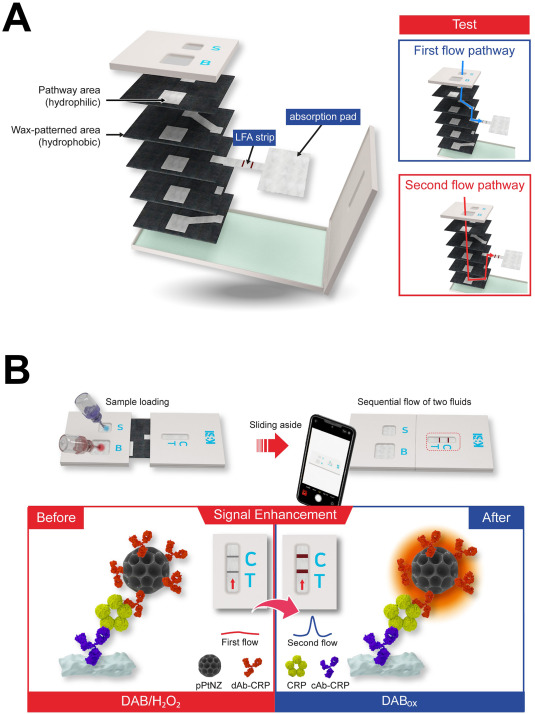Researchers from Korea Basic Science Institute (KBSI) and Hanyang University have developed a high-sensitivity rapid diagnostic paper slip chip that can effectively detect C-reactive protein (CRP) using non-invasive methods such as saliva and human blood.

CRP is a representative acute phase reactive protein that is secreted into the bloodstream from the liver within hours when infections, sepsis, autoimmune diseases, inflammation, myocardial infarction, malignancies, trauma, or tissue damage occur.
The existing CRP test method using blood samples was limited in its use for diagnostic tests for infants and the elderly, who may find blood collection stressful or burdensome.
In response, the research team, led by Professors Han Do-kyoung at KBSI and Seong Gi-hun at Hanyang University, developed a diagnostic slip chip that is similar to existing diagnostic kits but allows for high-sensitivity, non-invasive analysis.
This paper analytical chip designed with hydrophilic and hydrophobic patterns allows for the sequential injection of the subject's sample and a reagent that amplifies the detection signal.

To ensure high sensitivity in analysis, the research team developed a porous platinum nanomaterial that mimics natural enzymes and chose a method that amplifies the detection signal through an enzyme-substrate reaction utilizing its catalytic properties.
With this method, the team successfully detected CRP in saliva, which is present in much smaller quantities than in blood, within 35 minutes.
The paper chip has an error range of 5 percent compared to the standard ELISA (enzyme-linked immunosorbent assay) test conducted with serum optical equipment in general medical institutions, thus proving its reliability.
The team stressed that another advantage of the chip is that it has a simple test method, as the result of the CRP analysis can be intuitively confirmed through the color change in the detection part of the chip.
The change in color can be captured by a smartphone, and the exact test numbers can be determined through free software.
"This high-sensitivity diagnostic platform technology, which can analyze minute amounts of acute inflammatory substances present in blood and saliva, will be useful in quickly assessing the health status or severity of the body," Professor Han said. "We will actively seek cooperation with related companies to commercialize the rapid diagnosis technology for acute inflammation and infection."
The research results were published in the October issue of Biosensors and Bioelectronics.

